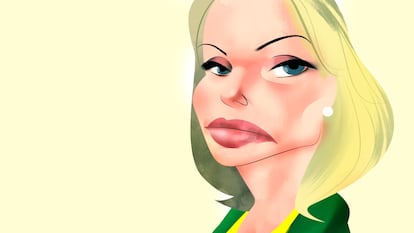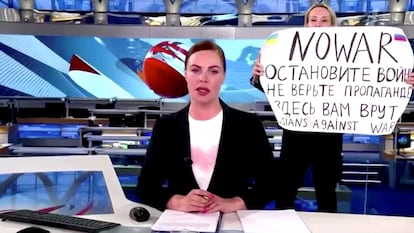Marina Ovsyannikova: The Russian journalist who condemned Putin’s war live on TV
The reporter — who, in March 2022, pulled out a sign during a broadcast on Russian state television to protest the invasion of Ukraine — now lives in Paris. In a new book, she shares her story

On March 14, 2022, at 9:30 p.m., Russian journalist Marina Ovsyannikova stepped into the most-watched newscast in the country, holding up a poster with a message against the war in Ukraine. The interruption lasted barely six second, but it was enough to turn her life upside down.
A few minutes later, the deputy news director approached her. “Was that you?” he asked. Her professional career at the state-owned Channel 1 ended at that very moment. But Ovsyannikova — who was born in Odessa, in 1978 — didn’t regret her actions in the least. After 20 years working at what she now calls a “propaganda machine,” she instantly became a symbol of resistance against the official narrative of Russian President Vladimir Putin.
Ovsyannikova’s gesture — which took place less than a month after Russia began its invasion of Ukraine — swept around the world, earning her a wave of support. In a speech, Ukrainian President Volodymyr Zelenskiy thanked the “girl who entered the studio of Channel 1.” French President Emmanuel Macron was quick to offer her protection. The journalist — born to a Russian mother and a Ukrainian father — initially rejected the offer. But this past February, she appeared by surprise in Paris, where she is now waiting for her asylum claim to be processed. She fled Russia in the middle of the night with her daughter, changing cars seven times, before eventually crossing the border on foot.
Following the act of protest, her mother — a fervent supporter of Putin, who raised Marina on her own after her father’s death — branded her daughter as a traitor. Meanwhile, her 18-year-old son refuses to speak to her. “I sacrificed everything to tell the truth,” Ovsyannikova tells EL PAÍS in English. Her 12-year-old daughter now lives with her in Paris.
The journalist joined Channel 1 in 2003, when she was barely 25-years-old. She had just arrived in Moscow and was ready to start from scratch, like many young reporters who come from the provinces. At that time, “the Russian information space was still relatively free and open,” says Lukas Aubin, an expert on Russia at the French Institute for International and Strategic Affairs.
Ovsyannikova had gained experience at Krasnodar’s regional television channel, in southern Russia, while completing her journalism studies at Kuban State University. Little by little, she worked her way up the ranks to serve as deputy editor-in-chief of the news and get her own show.
It was the “golden age” of Russian journalism, she recalls in her recently-published book, Between Good and Evil: How I Finally Opposed the Kremlin Propaganda. The situation, however, began to change gradually. In the interviews she has given, the journalist often refers to the 2008 invasion of Georgia as a turning point in the control exercised by the Kremlin over the media. At that moment, Ovsyannikova decided to ignore what she later decided to denounce.
In Moscow, she enjoyed comfortable working hours, which allowed her to travel to other countries, be with her children and her two golden retrievers, and continue swimming — her favorite sport since she was a child. It was also at the state-owned channel where she met her now ex-husband — the father of her children — who is currently employed by Russia Today. Her life was that of a middle-class woman. That is, until the war in Ukraine shook things up.
As editor of the international section, she saw what the global media was reporting about the conflict in Ukraine. She later decided to broadcast this on her own channel. “It was a parallel reality,” she declared. She could no longer see the images of burning buildings and fleeing refugees as mere abstractions. Christine Proske — her literary agent — describes Ovsyannikova as someone who has a “great sense of justice.”
The war in Ukraine reminded her of her childhood in Grozny, the Chechen capital, from where she fled just before the war broke out in 1994. Ovsyannikova refers to that period as a difficult time. At the end of the 1980s, she witnessed how daily life in the city changed. Armed militias appeared in the streets — outside her school, someone posted a message urging the Russians to return to Moscow.
On a crowded train, she arrived with her mother — a chemical engineer — in the Krasnodar region. Years later, while working in regional television, she would see the building where she had lived as a little girl. It was in ruins; her old neighbors survived in the rubble, she recounts in her memoir.
Partly for this reason, when the conflict broke out in Ukraine, she decided to act, without much thought. “She is someone who makes quick decisions… the opposite of someone who procrastinates,” Christophe Deloire notes. He is the secretary general of Reporters Without Borders, the organization that helped Ovsyannikova leave Russia. In the preface to the French edition of the book, he writes: “Ovsyannikova embodies the possibility of getting rid of a propaganda apparatus, of deserting it and resisting it.”
When breaking into the live news broadcast, the editor shouted: “Stop the war.” In her autobiography, she claims that she did not even recognize the sound of her own voice. When she walked out of the studio, her legs were shaking. The poster — which she had prepared the day before in her kitchen — had one sentence in English and three in Russian: “No to the war. Stop the war. Don’t believe the hype. They are lying to you.” To enter the building, she hid the banner in the sleeve of her white coat.

Tu suscripción se está usando en otro dispositivo
¿Quieres añadir otro usuario a tu suscripción?
Si continúas leyendo en este dispositivo, no se podrá leer en el otro.
FlechaTu suscripción se está usando en otro dispositivo y solo puedes acceder a EL PAÍS desde un dispositivo a la vez.
Si quieres compartir tu cuenta, cambia tu suscripción a la modalidad Premium, así podrás añadir otro usuario. Cada uno accederá con su propia cuenta de email, lo que os permitirá personalizar vuestra experiencia en EL PAÍS.
¿Tienes una suscripción de empresa? Accede aquí para contratar más cuentas.
En el caso de no saber quién está usando tu cuenta, te recomendamos cambiar tu contraseña aquí.
Si decides continuar compartiendo tu cuenta, este mensaje se mostrará en tu dispositivo y en el de la otra persona que está usando tu cuenta de forma indefinida, afectando a tu experiencia de lectura. Puedes consultar aquí los términos y condiciones de la suscripción digital.









































